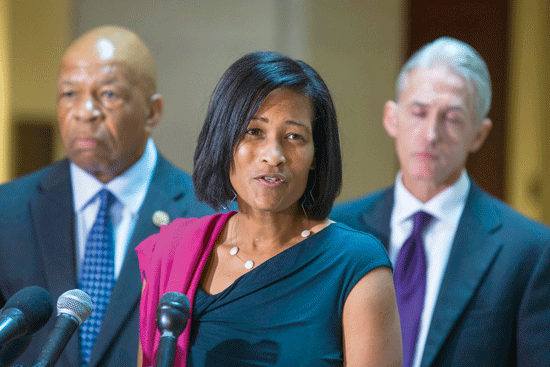

WASHINGTON: Democratic candidate Hillary Clinton said yesterday that she was sorry that her use of a personal email account while secretary of state caused confusion, in her most contrite comments yet about an issue that is plaguing her presidential bid.
Clinton, the Democratic front-runner for the November 2016 election, did not apologise for her own behaviour but said she was wrong not to use a government email account when she was serving as the nation’s top diplomat.
“At the end of the day I am sorry that this has been confusing to people and has raised a lot of questions but there are answers to all these questions,” she told MSNBC in an interview.
Clinton has faced steady criticism from political opponents since it emerged in March that she used her own email account on an unsecured private server in her New York home for official business, rather than a government-issued email address.
But asked directly by MSNBC anchor Andrea Mitchell in a lengthy sit-down interview whether she wanted to apologise to the American people for her choices, Clinton demurred: “I certainly wish that I had made a different choice and I know why the American people have questions about it,” Clinton said. “I take responsibility. I should have had two accounts, one for personal and one for work-related.”
Clinton’s slump in opinion polls has also given space for a possible run by Vice President Joe Biden. Biden, whose son died earlier this year, said on Thursday that he is trying to determine whether he has the emotional energy for a White House bid.
Clinton said that while she should have behaved differently, she had done nothing wrong. “It was allowed and it was fully above board. The people in the government knew that I was using a personal account,” she said.
The FBI is now investigating the security of the private server and any classified information on it. Reviews by Reuters of Clinton emails released to the public under a judge’s orders found 87 email threads that the State Department has marked to show they include information shared in confidence by foreign government officials, from prime ministers to spy chiefs.
US government regulations say this sort of information, whether written or spoken, must be classified from the start and handled through secure, government-controlled channels.
Clinton said she used the personal email account for convenience and did not give the issue much thought when she took over as secretary of state in 2009.
“I was not thinking a lot when I got in. There was so much work to be done. We had so many problems around the world. I didn’t really stop and think what kind of email system will there be,” she said. The interview was only her third on television since the launch of her campaign in April, far fewer than just about all of her Democratic and Republican rivals.
Clinton knows that journalists following her to the US island territory of Puerto Rico are less concerned, for now, with the candidate’s detailed proposals to improve the economy or fight climate change.
Asked if she was concerned that polls show many Americans distrust her, Clinton said “it certainly doesn’t make me feel good.
“But I am very confident that by the time this campaign has run its course people will know that what I’ve been saying is accurate.”
In a revelatory moment, Clinton admitted that in the whirlwind start to her tenure at State, there was little thought to how she would conduct her electronic communications. “We had so many problems around the world,” she recalled. “I didn’t really stop and think, what kind of e-mail system will there be.”
Three committees in Congress, which is controlled by Republicans, have launched aggressive investigations and have called on Clinton employees to testify, including her adviser Jake Sullivan and her longtime adviser and lawyer Cheryl Mills on Thursday.
Clinton herself testifies before a House panel October 22, nine days after the first televised Democratic primary debate. In March, as the scandal emerged, Clinton played down the hacking risk, assuring Americans that no classified information had been transmitted via her email account.
But as the controversy deepened, warning signs emerged in New Hampshire, where her approval rating has slid and polls show liberal Senator Bernie Sanders running neck and neck against her.
The state holds the second nominating contest in the nation, after Iowa, and a victory there could help pave her path to the nomination.
Clinton had been the frontrunner in 2008 against then-senator Barack Obama. Asked if she was worried that a similar opportunity could now be slipping through her fingers, Clinton was firm. “I don’t feel that,” she said.
While she acknowledged public “scepticism about politics, even cynicism,” Clinton said she would “keep making the case” for her presidency.
Reuters/Afp




